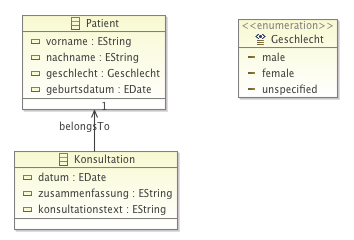Notice: This Wiki is now read only and edits are no longer possible. Please see: https://gitlab.eclipse.org/eclipsefdn/helpdesk/-/wikis/Wiki-shutdown-plan for the plan.
CDOQuery OCL
Based on CDO 4.0-SR2
For some basic references to OCL please find http://atlanmod.emn.fr/atldemo/oclturorial/ or http://cs.ulb.ac.be/public/_media/teaching/infoh302/oclnotes.pdf
Model
We have the following, deliberately trivial, model:
We have the entities Patient and Konsultation (Consultation), which hold some generic attributes resp. features. The enumeration Geschlecht (sex) is self explaining. Each Konsultation belongsTo exactly one Patient, it is however not contained by the patient but exists as independent entity.
Queries
This section documents some queries based on the aforementioned model. It is work in progress.
Queries are carried out on the whole Repository, so it is not important to what Resource an element belongs to.
Finding object references
The following OCL query finds all Konsultation entries in the entire repository, that belong to a certain Patient p, "injected" by the context. The element provided by the context is refered as self within the query.
CDOSession session = ... CDOTransaction cdoTransaction = session.openTransaction(); CDOQuery cqo = cdoTransaction.createQuery("ocl", "Konsultation.allInstances()->select(k:Konsultation|k.belongsTo=self)", ((Patient)p).cdoID(), false); List<Konsultation> lre = cqo.getResult(Konsultation.class);
The most important part in this query is the fact that we are comparing real objects, as k.belongsTo refers to an element of type Patient. For OCL CDO to evaluate this query correct, we need to pass the context objects CDOID object as otherwise we will receive an error. A direct comparison by simply passing (Patient)p as context is hence not possible.
OCL Query Examples
These query examples are pure OCL only, the need to be embedded into an OCL query!
Find all instances of PatientPatient.allInstances()Get the number of instances of Patient
Patient.allInstances()->size()
Note: The OCLQueryHandler uses lazy extents by default. That means that the OCL interpreter can already start using the extent before it's fully populated. But this means that the size of the extent may not be known at that time. If your query needs to know the size of the allInstances() set (which triggers the CDOExtentCreator) you need to tell the query handler not to use lazy extents:
query.setParameter("cdoLazyExtents", false);
Get all instances of Patient where nachname is exactly Descher Patient.allInstances()->select(p:Patient|p.nachname='Descher')Get all instances of Patient where nachname starts with G
Patient.allInstances()->select(p:Patient|p.nachname.substring(1,1)='G')Get the dates of all Konsultations
Konsultation.allInstances().datumGet the attribute numericId of all instances of Patient
Patient.allInstances()->collect(numericId)

